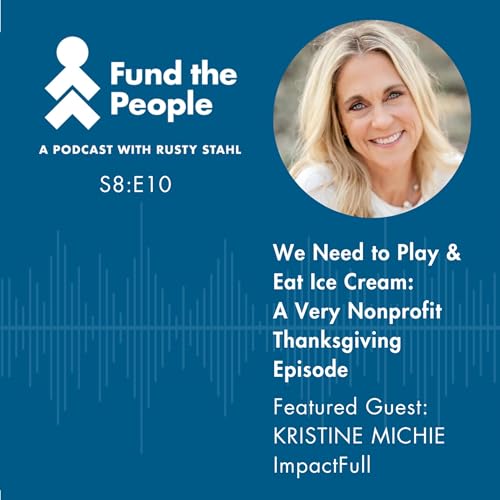Just in time for the Thanksgiving holiday, Rusty sits down with consultant and PlayFull Podcast host Kristine Michie for a lively conversation about the role of joy, play, and ice cream in sustaining the nonprofit workforce. Kristine shares how her lifelong roots in activism shaped her worldview, and how her consulting firm, ImpactFull, emerged with a mission to help social-change leaders weave fun, creativity, and moments of levity into the everyday grind of mission-driven work. Together, Rusty and Kristine explore why morale is so fragile in the current climate—and why nurturing hope, agency, and human connection is essential for impact.
Drawing on insights from nearly 200 interviews with changemakers, Kristine describes how play reduces stress, builds community, fuels innovation, and restores the emotional stamina required for nonprofit work. She offers practical strategies for leaders and funders—such as incorporating playful tools into board development, gamifying engagement, and creating small rituals of joy that strengthen team culture. Through stories, laughter, and yes, shared ice cream, the episode highlights a simple but powerful truth: when nonprofits integrate play into their work, they replenish the spirit needed to keep going and keep changing the world.
Related Episodes:
- Happy, Healthy Nonprofit People - with Beth Kanter
- Social Impact Grief: How to Mourn AND Organize in 2025 - with Meico Marquette Whitlock
Links to Resources:
- ImpactFull (Kristine's consulting practice)
- The PlayFull Podcast
- Rusty Stahl: Defending Civil Society in a Time of Political Threats (episode on PlayFull Podcast)
- Durfee Foundation
- Changemaker Camp
Guest Bio:
Kristine Michie is Founder of ImpactFull, Inc., creator of Provocative Joy Retreats, Changemaker Camp, and host of the PlayFull Podcast: Bringing Fun to the Serious Work of Changing the World. Her firm reinvents change-sector strategies with fresh approaches, including Board Development & Delight, Balance & Joy meeting facilitation, and Better Giving coaching for funder collectives. A published author, panelist, and speaker, Kristine brings joy to changemakers worldwide.
 44 分
44 分 48 分
48 分 39 分
39 分 33 分
33 分 40 分
40 分 54 分
54 分 48 分
48 分 9 分
9 分
